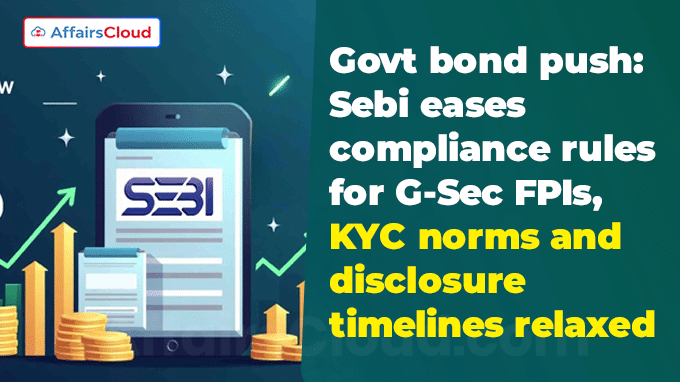 On 18 June 2025, the 210th Board meeting of the Securities and Exchange Board of India (SEBI) was held in Mumbai, Maharashtra, where the board approved compliance relaxations for Foreign Portfolio Investors (FPIs) investing solely in Indian Government Securities (G-secs) to simplify their onboarding process.
On 18 June 2025, the 210th Board meeting of the Securities and Exchange Board of India (SEBI) was held in Mumbai, Maharashtra, where the board approved compliance relaxations for Foreign Portfolio Investors (FPIs) investing solely in Indian Government Securities (G-secs) to simplify their onboarding process.
- This decision is expected to reduce paperwork and improve ease of doing business for the investors.
- Also, SEBI clears co-investment framework for Category I and II AIFs (Alternate Investment Funds).
Key Highlights:
i.Currently, foreign investors invest in Indian debt through three routes — General, Voluntary Retention Route (VRR) and the Fully Accessible Route (FAR).
- General Route: Foreign investors can invest in Indian debt within Reserve Bank of India (RBI)-prescribed limits and conditions.
- VRR: Allows long-term investments with relaxed norms in exchange for a minimum 3-year retention commitment.
- FAR: Permits unrestricted investment by foreign investors in specified government securities.
ii.Now, SEBI has eased regulatory compliances for FPIs investing exclusively in Government Securities (G-Secs) including:
- The periodicity of mandatory Know Your Customer (KYC) review for G –Secs FPIs shall be harmonized with RBI’s requirements. GS-FPIs will, therefore, have less frequent mandatory KYC reviews.
- Existing and prospective FPIs that exclusively invest in G-Secs under the FAR shall not be required to furnish investor group details. Such details are largely relevant for monitoring FPI exposures into equity and corporate debt only.
- Non-resident Indians (NRI), Overseas Citizens of India (OCI) and Resident Indians (RIs) individuals shall be permitted to be constituents of G-Secs FPIs without any restrictions applicable to other FPIs.
iii.In another easing of norms, SEBI set a uniform 30-day window for reporting all material changes by such investors, replacing the current requirement that varies between 7 and 30 days depending on the type of change.
iv.The above relaxation came at a time when FPI investment in FAR eligible securities has seen a significant increase and crossed Rs.3 lakh crore in March 2025, after several global index providers announced the inclusion of G-Secs in their respective bond indices.
SEBI clears co-investment framework for Category I and II AIFs
The SEBI has now allowed Category I and II AIFs to offer co-investment opportunities within the AIF structure, providing greater flexibility and supporting capital formation in unlisted companies.
- This change is expected to increase operational flexibility and reduce the compliance burden on AIF players.
Key Highlights:
i.Co-investment refers to an investment strategy where certain investors invest alongside a main investment fund (like an AIF) in the same deal or company, but directly and separately from the fund.
- Under current regulations, co-investment for AIF investors is facilitated through Co-investment Portfolio Managers under PMS Regulations.
ii.SEBI has now allowed AIF managers to offer co-investment opportunities to AIF investors through a Co-Investment Vehicle (CIV) model.
- For that, the CIV must be a scheme of a Category I or Category II AIF.
iii.CIVs will enable investors of any scheme of the AIF to co-invest in unlisted securities of companies where the AIF itself is investing.
- Also,a new CIV scheme must be launched for each co-investment in an investee company.
- And Co-investment through CIVs is allowed only for Accredited Investors (financially sound and SEBI-recognized individuals/institutions).
iv.Ease of doing business measures for Angel Funds include:
- Relaxation of floor and cap for investment in an investee company from Rs. 25 lakh–10 crore to Rs 10 lakh-25 crore respectively
- Removal of concentration limit of 25% of total investments of Angel funds in an investee company.
Important Terms:
Category I AIF – AIFs which invest in start-up or early stage ventures or social ventures or Small Medium Enterprises (SMEs) or infrastructure or other sectors or areas which the government or regulators consider as socially or economically desirable and shall include venture capital funds, SME Funds, social venture funds, infrastructure funds and such other Alternative Investment Funds as may be specified.
Category II AIF – AIFs which do not fall in Category I and III and which do not undertake leverage or borrowing other than to meet day-to-day operational requirements and as permitted in the SEBI Regulation.
About Securities and Exchange Board of India (SEBI)
Chairperson – Tuhin Kanta Pandey
Headquarters – Mumbai, Maharashtra




